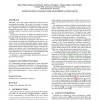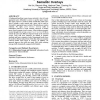105
Voted
ENC
2005
IEEE
15 years 8 months ago
2005
IEEE
This paper describes SKIMA, a mediation system that gives transparent access to heterogeneous and distributed sources considering their semantics and the semantics of application ...
118
click to vote
AINA
2005
IEEE
15 years 8 months ago
2005
IEEE
The number of web-based information systems has been increasing since Internet became the global open network accessible for all. The recent Semantic Web that provides supplementa...
119
Voted
WIKIS
2006
ACM
15 years 8 months ago
2006
ACM
Wikipedia is the world’s largest collaboratively edited source of encyclopaedic knowledge. But in spite of its utility, its contents are barely machine-interpretable. Structural...
128
Voted
WIKIS
2006
ACM
15 years 8 months ago
2006
ACM
Wikis are social web sites enabling a potentially large number of participants to modify any page or create a new page using their web browser. As they grow, wikis may suffer from...
103
click to vote
W4A
2006
ACM
15 years 8 months ago
2006
ACM
Graphical representations are a powerful way of conveying information. Their use has made life much easier for most sighted users, but people with disabilities or users who work i...
126
click to vote
SAC
2006
ACM
15 years 8 months ago
2006
ACM
A fundamental problem in peer-to-peer networks is how to locate appropriate peers efficiently to answer a specific query request. This paper proposes a model in which semantically...
113
Voted
MM
2006
ACM
15 years 8 months ago
2006
ACM
In this technical demonstration we show the current version of the MediaMill system, a search engine that facilitates access to news video archives at a semantic level. The core o...
138
click to vote
MM
2006
ACM
15 years 8 months ago
2006
ACM
In many image retrieval applications, the mapping between highlevel semantic concept and low-level features is obtained through a learning process. Traditional approaches often as...
100
click to vote
HT
2006
ACM
15 years 8 months ago
2006
ACM
Metadata attempts to describe the content, format, purpose and structure of data. Over the past few years, the IEEE-LOM standard has dominated the metadata world in e-learning app...
124
click to vote
SKG
2006
IEEE
15 years 8 months ago
2006
IEEE
In this paper we present design and development of the semantic grid services for the flood forecasting simulations. We will highlight the corresponding architecture and the proc...


